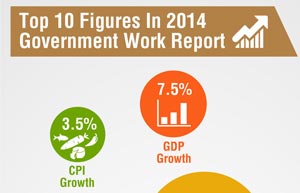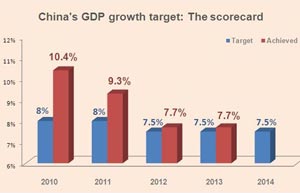NDRC plans internal reforms
By Zheng Yangpeng (China Daily) Updated: 2014-03-06 01:14Premier Li Keqiang has put this drive at the center of his reform program since taking office last March.
He engineered the project and vowed to eliminate one-third of the 1,700 administrative review and approval items held by various ministries under the State Council, China's Cabinet.
At Wednesday's briefing, Xu said the administration had eliminated or delegated 416 review and approval items since last year. The NDRC itself had eliminated or delegated 44 review and approval items, he said.
China has also revised the directory of investments that are subject to government approval, Xu said. The number of items that require central government approval has been cut by 60 percent.
To demonstrate the economic impact of these moves, Xu said another 2.5 million enterprises were set up in 2013, an increase of 27.6 percent over 2012.
Zong Qinghou, an NPC deputy from Zhejiang province as well as the founder and chairman of the Hangzhou Wahaha Group Co Ltd, said administrative approval reform involves the "lifeblood" of economic development.
But the speed of the current reform has been too slow and has encountered much resistance, Zong added.
"The problem cannot be really addressed when only a handful of approval items that haven't been exercised for quite a while are cut. Just in Zhejiang province, an overhaul of the approval item list showed there are 12,000 items. Nobody knows how many items there are nationwide," he said.
Qu Hai, an NPC deputy from Hunan province and mayor of Chenzhou, said the reduced approval items so far haven't been very substantial, while many "reductions" are actually consolidations of previously overlapping items.
"So far, reform is still elusive. We are keen to see something real," he said. Zhao Yinan contributed to this story.
|
 |
 |
- Experts: GDP growth target reasonable
- Top 10 figures in 2014 govt work report
- Xi urges Shanghai to spearhead reforms, opening-up
- What can China learn from other countries on reform?
- Reform cited as 'powerful impetus'
- Course for reform charted in the inner sanctum of Chinese politics
- Flawed IPO reform crippling market: Experts
- Reforms 'good news' for PE, VC firms, say experts
- NHTSA says finds no 'defect trend' in Tesla Model S sedans
- WTO rare earth ruling is unfair
- Amway says 2014 China sales may grow 8%
- President Xi in Europe: Forging deals, boosting business
- CNOOC releases 2013 sustainability report
- Local production by Chery Jaguar Land Rover this year
- Car lovers test their need for speed in BMW Mission 3
- China stocks close mixed Monday

















